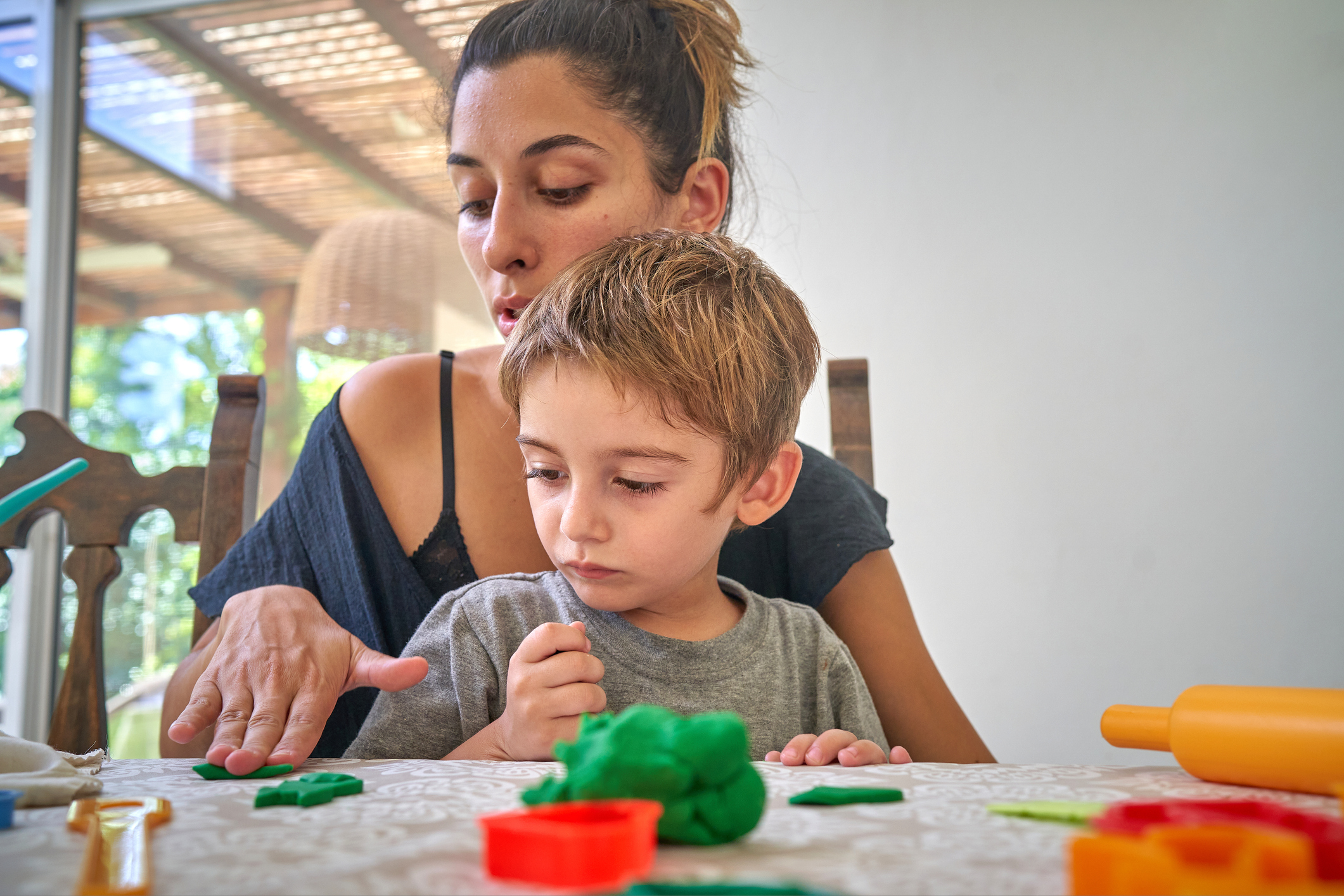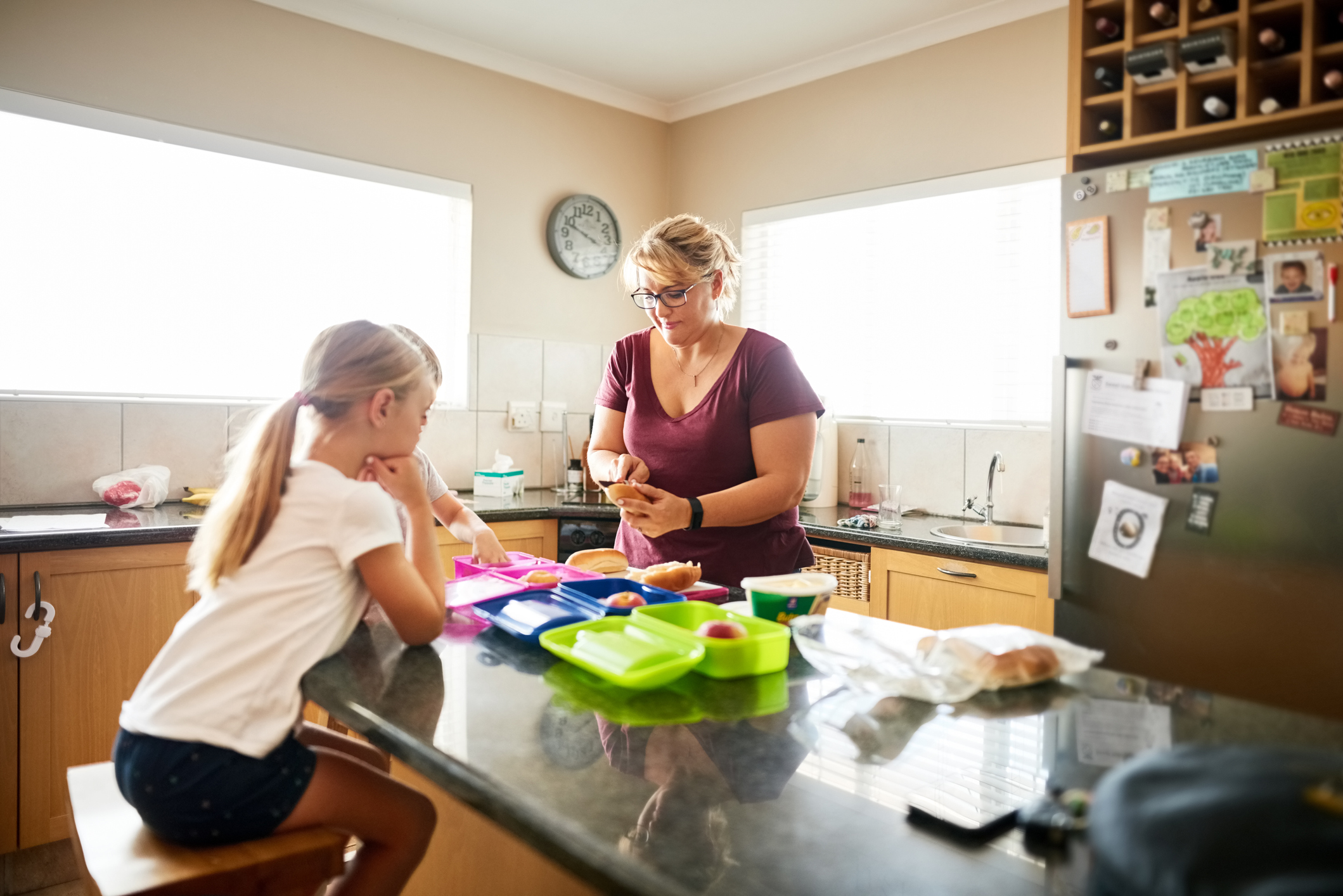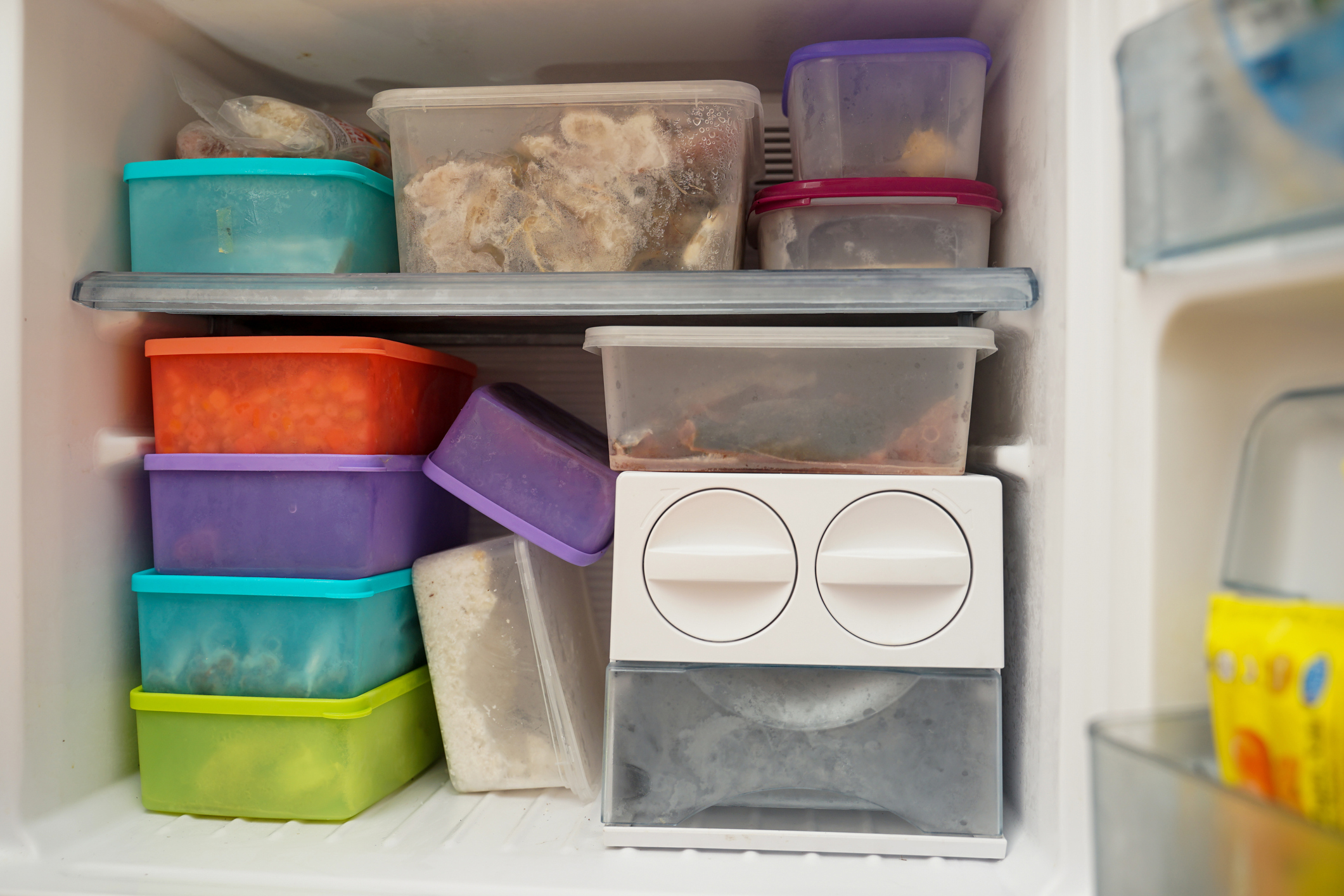
Raising a family is expensive, so knowing how to save money as a parent is crucial if you want to make your family's budget go further, and build a savings pot for the future. The last couple of years have seen budgets stretched more than ever before, leaving households scrambling to figure out how to make extra money to help make ends meet.
Even if your finances have weathered the cost of living crisis storm, it's always going to be worth cutting costs where you can. Personal finance analyst Alice Haine from Bestinvest says: "By slashing the amount you spend on everyday bills and cutting costs elsewhere, you can quickly create a small sum that will either boost your current account or be saved or invested into a separate pot for a rainy day."
Follows these family-friendly tips to reduce how much you spend on things like days out, entertainment, toys and food to ease the pressure on your budget and put more money away for your family's future.
1. Swap takeaways for fakeaways
Takeaways are all too tempting for tired and busy parents, but they are much more expensive than cooking food at home. If you have a weekly takeaway treat, try to reduce it to once a month instead as a way to save money. You could always try making a homemade takeaway whenever you get a craving for your favourite fast food.
2. Create snack packs for whenever you leave the house
We've all been there. You nip out with your little human, packing everything you need for changeable weather and to keep them entertained, but when they utter those three little words 'I am hungry' you realise that you have no snacks in your bag and have to resort to buying them while you're out. But this can prove really expensive, especially if you are somewhere like a theme park or zoo.
Instead, make up a few snack packs using non-perishable snackarooneys that you can leave in key places, like your handbag, car or byy the front door, so you can avoid getting caught out again.

3. Start a babysitting circle
As any parent will attest, taking time away from the kids for yourself, or for you and your partner, is key to keeping on top of your own mental health and wellbeing. But forking out for a babysitter can often put parents off taking this valuable step. But setting up a babysitting circle with your friends can be a great way to help each other out, without breaking the bank. To keep it fair, try setting up a rota, or work on a token system, where you earn a token every time you babysit, and it costs a token to get a babysitter.
4. Label your child's school uniform and other belongings
Sometimes, saving money is about making what you do buy last as long as possible. When it comes to your child's belongings or school uniform, this means making sure everything is labelled with their name so it can be returned to you if it gets left at a friend's house or in a classroom at the end of the school day. You can buy simple personalised washable and no-iron labels on Amazon for around £10-15. Some even come with cute designs, like this Amazon bestsellers.
5. Make your own playdough
Looking for a really inexpensive way to keep kids entertained? Why not make your own playdough? Let kids pick their favourite colours and let them unleash their creativity. To make your own, you will need:
- 1 cup flour
- 2 tbsp cream of tartar (which you can get in the baking aisle at the supermarket)
- ½ cup salt
- 1 to 2 tbsp cooking oil
- 1 cup water
- food colouring
Mix the flour, cream of tartar and salt in a saucepan. Add the water and oil and cook over medium heat until thick. At this stage you can either add a few drops of food colouring to the mixture and kneed in. If you want two colours, split the mixture and add different colours to each half. Then hey presto, home-made playdough.

6. Swap toys and clothes with other families
Buying toys and clothes for your kids can be expensive, especially when they outgrow things so quickly. But remember, this is the same in every family, so why not team up with neighbours, friends and school mums and see if you can arrange a toy or clothing swap? This works best if you can set up a group of parents with kids of different ages, but if your kids are the same age, it's a good way to swap toys your kids no longer play with for something new to them.
7. Make packed lunches
Making packed lunches for the whole family is a no-brainer when it comes to saving money, especially when you tot it up over the course of a week. If mornings are hectic in your family (we hear ya!), then it's a good idea to get into the habit of making lunches the night before. It can also help to give everyone in the family their own colour-coded lunchbox so that there's no worry about someone taking the wrong lunch to school or work.

8. Accept hand me downs
There's no shame in accepting hand me downs if you are trying to save money. In a lot of cases, you'll be helping someone out by helping them find a new home for their belongings. As well as easing the strain on your bank balance, it's also really good for the planet and reduces the amount being sent to landfill.
9. Buy own brand painkillers
In many cases, if you choose to buy branded medicines, you're paying more for the brand name and a snazzier box, rather than for high quality or more effective ingredients. When you're looking to buy medicine, check the branded box for a nine digit code, which is called the Product Licence Code. Then take a look at the retailer's own brand version. If the two codes match, it's not just the same active ingredient, it's the exact same tablets. Check out this real life example highlighted by money saving expert Martin Lewis.
10. Shop around for fuel
While we have been benefitting from a temporary fuel duty cut since March 2022, this is due to end in March 2024, so it's vital that you keep an eye on how much you are paying for fuel, especially if you need your car for the school run and weekend activities with the family. Use this fuel prices tool from Go.Compare to find the cheapest fuel near you.
Remember there are lots of other ways to save money on fuel, including keeping your tyres inflated, accelerating and braking gently and not driving around with unnecessary cargo. Car sharing where you can and avoiding unnecessary short journeys can also help you to use less fuel.
11. Grow your own veg
Save money and start a hobby with your kids by growing your own vegetables. For beginners, veggies like beetroot, potatoes, salad leaves, peas, radishes and courgettes are a good starting point. And if you don't have the garden space to plant your seeds, according to Gardener's World there are lots of things you can grow in bags, pots and even on your windowsill.

12. Book early and in advance for any activities
Keeping the kids occupied can gouge a big chunk out of the family budget especially in the school holidays. Save money by booking big trips to the likes of zoos and theme parks online rather than rocking up on the day, or see if you can cash in supermarket loyalty points. You could also keep your eyes peeled for free adult ticket promotions that regular appear on Kelloggs cereal boxes.
13. Do you really need a TV licence?
If you exclusively use streaming services to watch boxed-sets or films on demand, but are still paying for a TV licence, you may be wasting money. You need a TV licence if you watch or record live TV, on any channel or streaming service. But if you only watch programmes on demand (with the exception of BBC iPlayer), you don’t actually need a TV licence so could save yourself £159 per year (if you pay annually), rising to £169.50 from April 2024.
14. Team up with another family for days out and holidays
Joining forces with another family on things like day trips, mini breaks or holiday can be a great way to share the cost on things like accommodation, car hire and fuel costs. You could also benefit from discounts on group entry tickets to popular attractions. Make sure you agree how joint costs will be split ahead of time to avoid any fallouts.

15. Be a savvy shopper
Whether you are shopping online or in a shop or supermarket, keep in mind that a retailer is always trying its best to make you buy things - and the more things the better. It might be that it displays more expensive items at eye level with cheaper items lower down, or sends you regular emails with multibuy or money-off offers. (We reveal the sneaky supermarket tricks to look out for!).
GoodtoKnow’s Money Editor Sarah Handley says: “If you’re looking to save money, you need to be savvy about all of the moves that retailers make to encourage you to buy things you don’t necessarily need. To avoid temptation, unsubscribe to the emails, turn off app notifications and plan purchases ahead of time and budget for them rather than buying on impulse.”
16. Try a different supermarket
Switching to a different supermarket can be a great way to save money on your food shopping, especially when you consider the price difference between the most expensive and cheapest supermarket. Buying online if possible is a great option. It’ll help you avoid impulse buys, and you can check your fridge, freezer and cupboards as you are adding items to your basket to avoid buying items you don’t need. But if you do buy online, try to choose the collection option rather than delivery to keep costs low. If you do need your shopping to be delivered, try to be flexible on the day and time you want it delivered to get the cheapest delivery price.

17. Remember your loyalty card - and your bags
If you’re shopping somewhere with a loyalty scheme, make sure you flash your supermarket loyalty card. In some cases, you’ll get exclusive discounts or coupons, and in others you’ll be able to exchange loyalty points for things like restaurant vouchers, theme-park and cinema tickets and more. Save enough points and you can get a family day out for free! Also remember to take your own bags with you - you can pay anywhere from 10p to 50p for a reusable bag from your local supermarket which can soon tot up if you are doing a big shop.
18. Try to reduce leftovers
We throw away a whopping £700 of food per household each year but there’s lots of ways to reduce food waste..
This might be:
- Using every part of the fruit and vegetables that you buy
- Making your own stocks and sauces
- Freezing leftovers
- Having a ‘use up’ day once a week.

You can always try using your freezer more to increase the shelf life of your shop. You can try this cheese hack if you're wondering whether you can freeze cheese, or even try freezing avocado or cooked pasta.
19. Buy a brand level lower
If you normally buy branded products, like Walkers, Kelloggs or Coca Cola, try buying supermarket own brands instead. If you already buy supermarket own brands, then try out the value or basics range to see if you can tell the difference. In many cases, you and your family won't notice the difference anywhere other than your bank account. To test the waters, try it with the following items:
- Rice and pasta
- Over the counter medications, such as paracetamol or hay fever tablets
- Hand soap and shower gel
- Canned foods like beans and chopped tomatoes
- Cereals
- Nappies
- Baby wipes
- Washing up liquid
- Laundry detergent
Even if you end up going back to old favourites for some items, if you stick to the new brand level for certain products, you’ll save some money.
20. Don't leave appliances on standby
Many of us tend to think of an appliance on standby as being off. But when you look at it in terms of energy consumption, ‘standby’ and ‘off’ are two very different things. Some appliances can even use as much energy while on standby as they do when they are on, which means you could be wasting money unnecessarily.
Another way to reduce your energy use is to use a smart plug, which can be really useful for devices in kids bedrooms. A smart plug will allow you to control them from your smartphone, and turn them off remotely. As well as saving energy, this can also help you if you need to impose a cut off time for your kids using specific devices.
21. Do you really need to use a tumble dryer?
When you are doing family-sizes loads of washing, sometimes multiple times per week, your tumble dryer will feel like an essential. But tumble dryers are energy-guzzling appliances, so it makes sense to use this particular appliance less, where you can. If you’re looking for how to dry clothes without a dryer, you might choose to dry your clothes outside on dry days, or dry them on an airer or on radiators indoors. We've ranked the cheapest way to dry clothes to help. If you need to dry clothes quicker, it could be worth investing in a heated airer or a dehumidifier which both cost less to run than a tumble dryer.
22. Turn the thermostat down
According to the Energy Saving Trust, you can save around £80 a year by turning your thermostat down by just one degree - and it’s likely you and your family won’t even notice a difference in your comfort levels. You could also look at how many hours a day you have the heating on, and see if you can reduce that number to help save money.
23. Bleed your radiators
Bleeding your radiators can help your heating system work more efficiently, improving how effectively your home is heated. This means you might be able to have your heating on less which can save you money. It’s an easy task to complete yourself. You just need a towel, a bowl to catch any drips and a radiator key.
24. Do you qualify for any council tax discounts?
Council tax is one of those priority bills that you must pay, however there’s still ways to save. Check what qualifies for council tax reduction and whether your circumstances mean you are eligible (if you're a single parent, definitely check out whether you could be receiving a 25 per cent discount on your bill. Even if you don't qualify for a discount, you can reduce how much council tax you pay each month by arranging to pay your annual fee in 12 monthly instalments rather than 10.

25. Save on train travel
If you’re after cheap train tickets, book in advance and see if you can save by split ticketing, where it can cost less to buy one or more tickets to cover a single journey on the same train. With rising pump prices – filling up the car is a luxury so you could save money taking the train instead of driving. Plus you’ll save on car parking too!
26. Buy second hand
Whether it’s clothes, homewares or toys and games - buying second hand is a brilliant way to spend less and save money. Local charity shops are a good choice, but you can also check out apps like Vinted, Depop and Preloved, as well as eBay and Facebook Marketplace. You can get in on the action and sell your unwanted items online too. Read our guides to how to sell clothes online and how to sell your old gadgets for clear tips to see you through the process.
27. Buy in bulk or extra value sizes
Buying extra value sizes (or buying in bulk) can be a great way to save money on household and food items, like toilet roll, surface cleaner, washing tabs, crisps and cereal. But it’ll only prove to be a bargain if you use up everything you buy. Avoid bulk buying a product you’ve never used before, even if it’s a good deal, because if you don’t like it, you're either lumbered with having to use up a product you hate, or you’ll end up buying an alternative.

28. Cut your childcare costs
Pay for child care while you work? See if you're eligible for 30 hours free childcare or claim some cash back from combination of Working Tax Credits, or the new tax-free childcare scheme that pays out up to £2,000 per child. Different options suit different people, but it’s worth wading through the Government website Childcare Choices to find what works for you.







